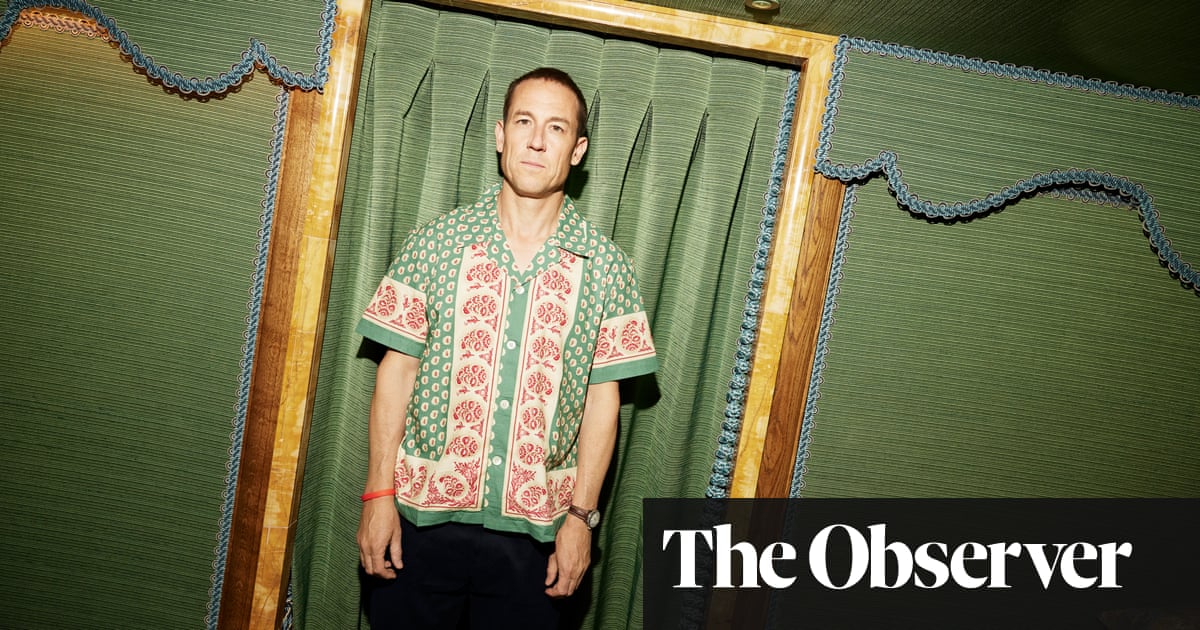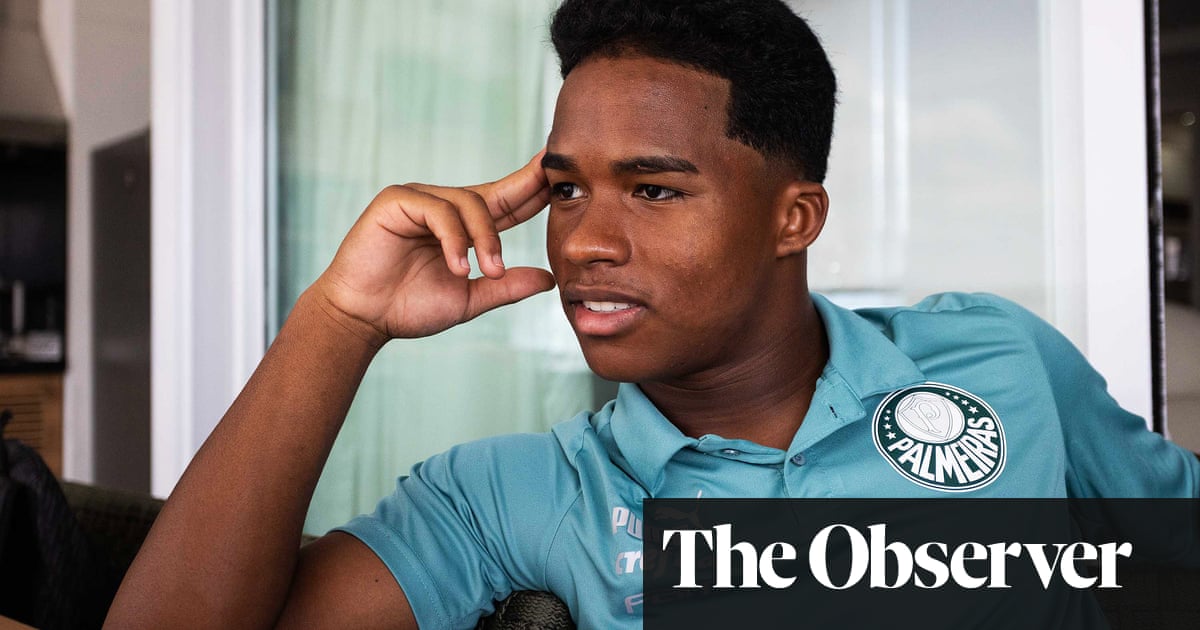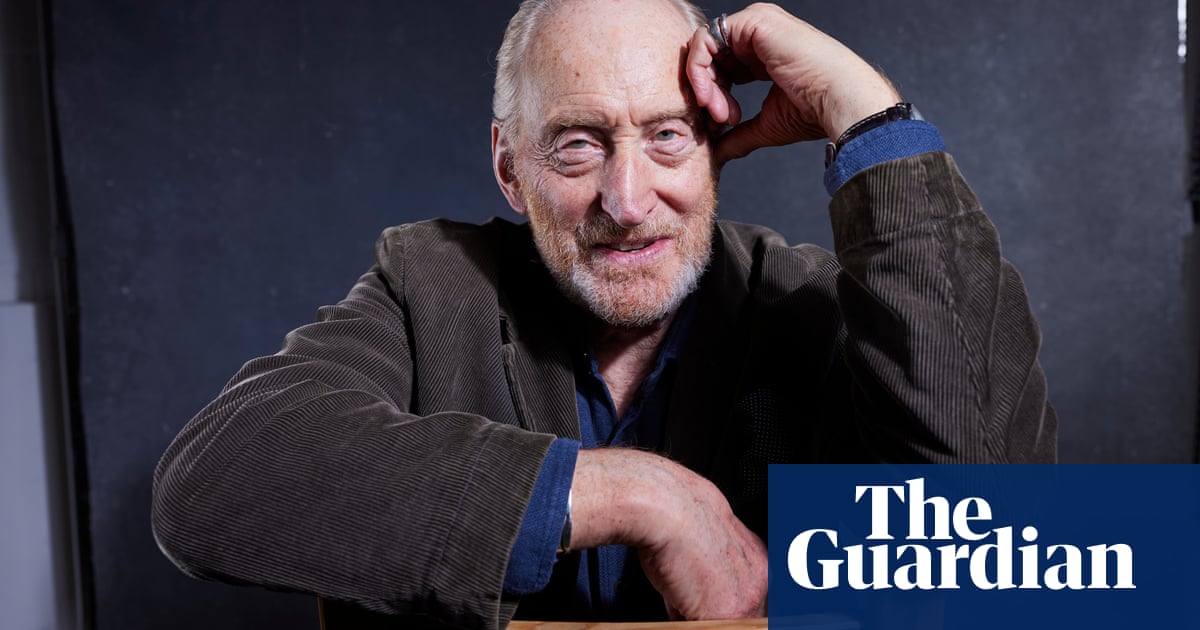
As a child, the British actor Tobias Menzies was a talented junior tennis player. At the beginning of the Covid pandemic, he decided to see if he could get his game back. He joined his local club in north London and started hitting, mostly on his own with a machine firing balls at him, at least a couple of times a week: for the first six months, he only struck forehands; then he did a similar stint on his backhand. Two years on, Menzies has finally felt ready to contest matches, mainly against the club pro.
“When I started playing again, I thought, ‘OK, I’m going to do my 10,000 hours, I’m going to start again,’” says the 49-year-old Menzies, referring to the principle, popularised by the writer Malcolm Gladwell, that it takes that amount of time to achieve expertise in any field. “I’m monomaniacal, I get slightly obsessive. I don’t get bored by hitting forehands for six months, that’s just how my brain is.”
The methodical rigour and discipline that Menzies has applied to tennis seems very much to mirror his approach to his day job. He has been acting for 25 years now and there is a sense that he has been learning, taking notes and adjusting the whole time. He’s had some meaty roles, such as his big TV breakthrough as Brutus in the (saucy) BBC/HBO drama Rome in the mid-2000s, and his dual performances as the academic Frank Randall and his sadistic ancestor Black Jack Randall on the wildly popular time-travel series Outlander (also saucy).
But almost more impressive are the smaller parts in some of the finest series of recent times; how often Menzies backs the right horse: there he is as Edmure Tully in Game of Thrones or Sharon Horgan’s gynaecologist in Catastrophe or Aisling Bea’s gruff love interest in This Way Up or a villainous spook in The Night Manager.
And then, boom! One day, the 10,000 hours pays off. After the Netflix historical drama The Crown had run for two successful series, the show’s creator Peter Morgan was looking to recast the main characters for the next pair of instalments. Olivia Colman signed on to be the Queen in middle age, with first Mark Strong, then Paul Bettany, lined up to play Prince Philip. But it fell through with those actors, and Menzies found himself in an audition room with Colman, reading 10 pages of a draft script. Two weeks later, he was offered the gig.
Did he have any hesitation in accepting? Menzies, who today wears a loose linen shirt and bookish specs, and is assiduously polite, but now looks, frankly, like the question is so stupid that it might be a joke. “No, I had an instinct that I could do something with Philip,” he replies, when we meet in a pub near where he lives. “Olivia was already onboard and I thought that was a very exciting thing to try to build that marriage with her. And I had admired the first two seasons, I liked the writing on it. So no, I wasn’t nervous about going into that. I was like, ‘I think this could be really good.’”
Menzies won an Emmy, and was nominated for a Golden Globe, for his portrayal of Philip. He’s never totally happy with any of his performances – that’s not his style – but the role is the closest that he has been to being not actively unhappy. One episode in season three particularly stands out: it is 1969 and Philip becomes obsessed with Neil Armstrong and the Apollo 11 astronauts landing on the moon. There are long stretches without dialogue, the camera lingering on Menzies’s face as he makes the Prince almost childlike with wonder and envy. He’s smiling, but on the verge of tears: it’s obvious to the viewer – though not him – that Philip, a passionate and apparently talented pilot who had to leave the military after the Queen’s coronation, is experiencing some kind of existential crisis. It’s a masterclass in not overacting.
“That episode of the moon landings, I felt that got very close to something that I was really hoping to do with it,” says Menzies, as near as he’ll ever come to bragging. “So that was probably something I’m most proud of. I fully felt like I was in the right person’s hands in the right moment with that performance. You need a few things to come together at the same time, you need a bit of luck, sometimes. Even if you’re doing all the work to put yourself in a position, you never quite know if the cake’s going to rise.”
The Crown has been a gamechanger for Menzies. We are meeting to discuss a new film, You Hurt My Feelings, directed by indie darling Nicole Holofcener, in which he stars opposite Julia Louis-Dreyfus. He’s about to spend the summer travelling the world with Brad Pitt shooting a Formula One film for Apple TV+ made by the team behind Top Gun: Maverick and produced by Lewis Hamilton (actors strike permitting). “The Emmy [for The Crown] was a big deal,” he says. “But the honest answer is, I can’t point to something and go, ‘Well, that led to that…’ It’s a bit more ephemeral than that. But overall, I get a sense that I’m having conversations with people a little earlier in the process now. You are entering the river further upstream.”
So the work is great now, but the attention that goes along with it is not always entirely welcome for Menzies. He’s quite enjoyed a career where, even if people do recognise him, it takes them long enough to work out where from that he’s moved on and no exchange is required. “I’ll put it like this: ‘I quite like to watch the world and not have the world watch me,’” he says. “A big part of being an actor is behaviour. How do people exist in different situations? You get that from watching people. And obviously, if those people start watching you, that’s a different thing.”
Menzies was born in London: his father was a radio producer for the BBC; his mother was a drama teacher. They separated when he was six, and he moved with his mother and brother to Kent. He attended a Steiner school from the age of seven to 14, before going to an independent school in Surrey for his exams.
“I have a lot of time for the Steiner system,” says Menzies. “The education is very broad and there’s plenty of performance in it. Often as a class you will get up and recite a poem… so the idea of performance is less special. Everyone does it. And, funnily enough, when I left that system and went to, quote-unquote, a normal school, I actually didn’t fall into the performance crowd there, because it was this separate thing that the drama lot did and I wasn’t hugely in that crowd. So I only did one play while I was there.”
Outside the classroom, though, his mother was schooling him in theatre, from big shows at the National to more avant garde work by companies such as Complicité or Shared Experience. His original plan for when he finished school was to study mime at the Jacques LeCoq theatre school in Paris: “That’s where all my heroes – all the Complicité lot, who were my gods – had all gone.” But he couldn’t raise the funds and ended up – not too shabbily – at Rada instead, where his classmates included Sally Hawkins and Maxine Peake.
After graduation, the work came and has continued. Why does he think that is? His first response is: “I’m competitive.” But then he takes a moment and gives a more considered answer. “I feel quite porous as a person in my life,” he says. “That can make me sometimes not the most definite in my opinion, because I’m often, like, ‘Well, there’s this side… But then, of course, there’s that…’ So that thing, which isn’t very useful in life, is quite good for getting under the skin of people.”
The skin Menzies has to get under in You Hurt My Feelings is Don, a New York therapist who seems to have a lot going for him. He has an affectionate relationship with his wife, a writer named Beth (played by Louis-Dreyfus) and they have a grown-up kid (Owen Teague) who manages a pot store, but writes plays on the side.
Slowly, however, the facade is chipped away. Don starts to suspect that his clients think he’s doing a bad job (with some justification, as it turns out). He’s neurotic about his appearance, fixated on the lines underneath his eyes. But You Hurt My Feelings really hinges on an awkward moment when Beth overhears Don describing her new book to a friend in somewhat tepid terms. As problems in the world go, it’s the smallest of small beer, but the loss of trust has seismic implications for their relationship.
You Hurt My Feelings is a funny and thought-provoking film, and Menzies and Louis-Dreyfus make for a believable, winning couple. Menzies is also a very convincing therapist, something he puts down to his own time on the couch. “I’ve had lots of therapy in my own life,” he says. “So it wasn’t that hard to imagine myself into the room.”
What benefit does Menzies find from therapy? “What do I want to say about that?” he replies, leaving a long pause. “It’s been a real lifeline for me over the years, in the simplest terms, to navigate my life. To deal with the challenges that have come along. To have a neutral space in which I can, without fear of judgment and ridicule, articulate things I’m ashamed about or things that unsettle me or upset me. It has given me much higher levels of mental health and it’s been a powerful resource in my life, for sure.”
Work rarely comes up in the sessions. “No, that’s not my experience,” says Menzies. “A lot of the things I’ve taken to those rooms and worked on in those rooms have been my life and my personal life. My work life has been a pretty consistent and stable part of my life. It’s often been more relational and family stuff.
“Some actors talk about losing themselves in roles,” he goes on. “That’s not something I’ve ever really struggled with. I’ve often been drawn to quite dark work, but I find it quite cathartic. I really enjoy taking things that might, in other bits of my life, feel burdensome or problematic… taking that lead and transforming it into gold.”
There’s a reason Menzies saves discussion of his private life for his therapist and not, say, journalists from national newspapers. He never talks about a partner, nor is photographed with anyone at events. Menzies drops only crumbs about his life away from acting. He enjoys drinking wine, going to the theatre and riding his bicycle round the city. He spent ages renovating his flat, a Victorian terraced maisonette, and during the process he moved in with Helena Bonham Carter, his co-star on The Crown. Now he’s started fixing up the garden, growing salad leaves and tomatoes that he hopes won’t die when he goes off filming.
“I’m broadly speaking pretty publicity shy,” he says. “I like to have a private life. Celebrity can have a quite a substantial effect on what it is to watch that person. And that’s no fault of the person. But it’s just a part of the conversation. So the less that’s in the way, the more interesting.”
In You Hurt My Feelings, Don looks in the mirror and dislikes what he sees. How does Menzies feel? “God, that’s a really intimate question,” he says, blowing out his cheeks. “Depends. Sometimes I feel OK. And then other times I don’t like what I see. But there’s absolutely nothing to be done about it, is there really? Well, I mean, except plastic surgery, as the film suggests, I guess there’s that route.”
Menzies hasn’t gone there yet? “I haven’t,” he smiles, “and thus far, no intention.”
Considering that one of his recent standout performances portrayed a man on the verge of a midlife crisis – Menzies is pretty well the same age as Philip was when he watched the moon landings – the actor feels Zen about what the next few years hold. First off, there’s spending the summer with Brad Pitt. The film, which may be called Apex, follows Sonny Hayes (Pitt), an F1 driver who retired from the sport in the 1990s after a crash; Menzies plays an investor in the racing team who brings him back from the wilderness. They are shooting at five actual grands prix: they started at Silverstone for the British GP earlier this month, then Hungary, Monza in Italy, Abu Dhabi and Las Vegas. “So it’s a little bit guerrilla,” says Menzies.
He does, though, concede he’s more of a Wimbledon guy or ideally the French Open (“It’s so gladiatorial!”) than an F1 nut. “I don’t know a huge amount about it,” he admits, “so yeah, I’ve been binge watching Drive to Survive [the Netflix documentary], trying to work out what’s going on.”
At the pub, Menzies rises to leave and then decides he’s going to stay and do some “head scratching”. It’s a very Menzies way to spend an afternoon, but at least his patient, thoughtful approach is paying off. “Acting has treated me well,” he says, after we decide that I’m going to leave, not him. “To be honest, I’m not sure I’m good for much else, so it’s lucky that this has worked out.”
Styling by Hope Lawrie; grooming by Maria Comparetto at The Only Agency using Typology; digi operator Nick Graham; stylist’s assistant Carissa Harrod
You Hurt My Feelings is streaming on Prime Video from 25 July












